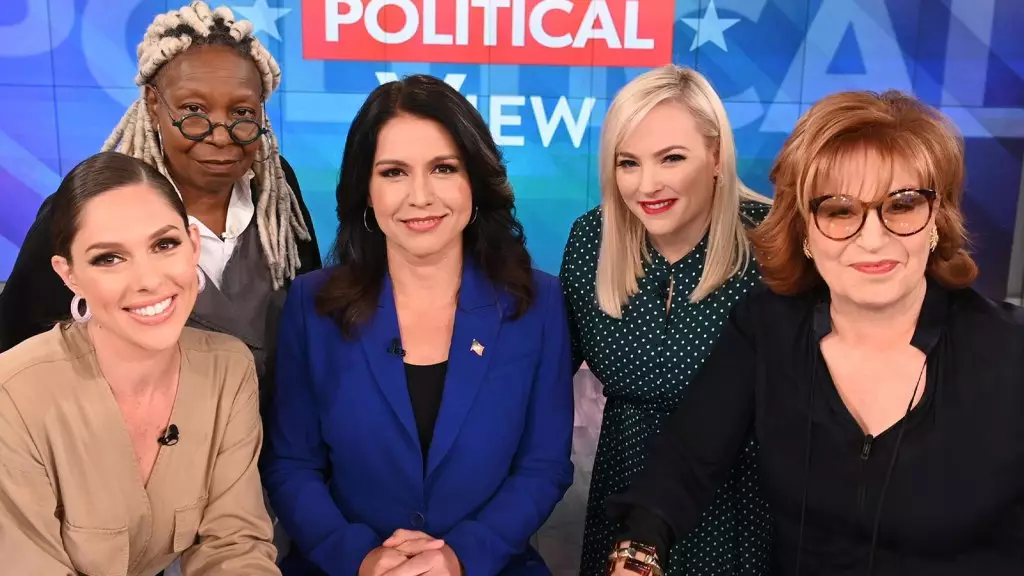Meghan McCain has recently emphasized the strength of her friendship with Tulsi Gabbard, particularly in light of their shared experiences on the talk show circuit. Their relationship, haunched back to Gabbard’s appearance on “The View” in 2019, has served as the backdrop for McCain to critique her former co-hosts. This evolvement from co-hosts to companions shines a light on the dynamics of modern-day political discourse and media portrayals, especially concerning women in politics.
At a recent event called Stand with Women in Philadelphia, Gabbard reminded McCain of their last shared stage when she appeared on the popular ABC talk show. It was there that McCain recalled her protective instincts kicking in, driven by a desire to shield Gabbard from potential verbal ambushes from other hosts. The camaraderie they developed illustrated an unexpected alliance, contrasting significantly with the cutthroat atmosphere often depicted within mainstream media narratives.
The juxtaposition of their professional experiences reflects underlying themes of fear and admiration. According to McCain, while Gabbard held her ground under pressure, others sought to undermine her in a hasty and predatory manner. “They were so scared of her,” McCain recalled, showcasing how polarized political opinions can distill into personal vendettas. Her description of the other co-hosts as “vultures” reveals not only her protective instincts for Gabbard but also her growing disenchantment with the show’s environment.
The implications of this exodus from a once-coveted platform extend beyond personal relationships; they highlight the ongoing issue of women navigating power dynamics in male-dominated political spheres. Gabbard’s steadfastness during the show’s tumultuous segments symbolizes a new breed of female leaders, unafraid to challenge dominant narratives. McCain’s exuberance after Gabbard’s standoff with a formidable co-host showcased a supportive yet competitive spirit—one that can only emerge in spaces where women are not pitted against one another.
Tailored Tension with Co-hosts
In juxtaposition to McCain’s blossoming friendship with Gabbard, her critiques of her former “View” co-hosts reflect a deeper tension that lingers. Recent social media skirmishes suggest an ongoing rivalry; McCain has taken offense to comments that she interpreted as subtle jabs towards her. When Ana Navarro made remarks surrounding nepotism in politics, McCain felt a sense of personal affront. Meanwhile, Haines’ comments on the pandemic struck a similar chord.
Despite her exit from the show in 2021, McCain remains embedded in its narrative. “These women will never quit me,” she stated, indicating an understanding that past experiences, while contentious, cannot simply be brushed aside. Instead, they manifest as ongoing discussions in the public eye, creating a lingering debate surrounding female empowerment and the complexities of friendship amid rivalry.
Post-“View,” McCain has launched a series of criticisms about the show, branding it as a “rigged show” and referring to her former co-hosts as “crazy old people.” Such remarks evoke the question of how public personas can grapple with loyalty, betrayal, and authenticity. While the camaraderie between McCain and Gabbard suggests a new path for women in political discourse, McCain’s vitriol towards her previous co-stars indicates unresolved issues that haunt both personal and professional spheres.
Although she acknowledges friendships with production staff, McCain openly admits to cutting ties with the prominent co-hosts on the show. “I don’t talk to any of the main co-hosts that I was with,” she stated, revealing a clear division between her past self and current identity. “There’s not a chance in hell” that she would consider returning to the platform that once shaped her career trajectory, highlighting the precarious relationship many women navigate in the media landscape.
The relationship dynamics between Meghan McCain and Tulsi Gabbard serve as a powerful lens through which we can examine the complexities of political engagement and media representation. As McCain continues to critique her former associates while building alliances outside of that world, the interplay of friendship and rivalry provides a fascinating insight into the struggles women face in a rapidly changing, often hostile political environment. Their story illustrates how solidarity can emerge from tension and serves as a reminder that meaningful connections can often flourish in spaces marked by adversity.

